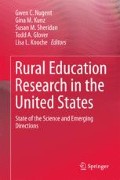Abstract
This chapter focuses on perspectives and recommendations of rural education researchers, practitioners, and policy makers about the critical role of research in rural education, the current condition of rural education research, and future directions. These perspectives were obtained from focused discussions of participants attending Connect-Inform-Advance, a National Conference on Rural Education Research held in April 2013 and sponsored by the National Center for Research on Rural Education. In order to capture the depth of these discussions, extensive notes were taken and analyzed qualitatively to glean insight into key considerations for future rural education research agendas. Results from the analysis resulted in four major themes: (a) defining and accounting for the rural context and culture, (b) identifying rural influences on student outcomes, (c) engaging in interdisciplinary and multidirectional research partnerships, and (d) disseminating rural research results and determining future targets.
Access this chapter
Tax calculation will be finalised at checkout
Purchases are for personal use only
References
Arnold, M. (2004). Guiding rural schools and districts: A research agenda. Aurora, CO: McREL.
Arnold, M. L., Newman, J. H., Gaddy, B. B., & Dean, C. B. (2005). A look at the condition of rural education research: Setting a direction for future research. Journal of Research in Rural Education, 20(6), 1–25.
Bazeley, P. (2013). Qualitative data analysis: Practical strategies. Thousand Oaks, CA: Sage.
Cicchinelli, L. (2011). Rural schooling: Necessity is the mother of innovation. Invited presentation, Advances in Rural Education Research Speaker Series at the National Center for Research on Rural Education, Lincoln, NE.
Coladarci, T. (2007). Improving the yield of rural education research: An editor’s swan song. Journal of Research in Rural Education, 22(3), 1–9.
Creswell, J. W. (2012). Qualitative inquiry and research design: Choosing among five approaches. Thousand Oaks, CA: Sage.
Hatch, J. A. (2002). Doing qualitative research in education settings. Albany, NY: State University of New York Press.
Johnson, J., Showalter, D., Klein, R., & Lester, C. (2014). Why rural matters 2013–2014. Washington, DC: Rural School and Community Trust.
Saldana, J. (2013). The coding manual for qualitative researchers. Thousand Oaks, CA: Sage.
Acknowledgments
We thank our colleague Michelle Howell Smith for her critical review and suggestions for this manuscript.
Author information
Authors and Affiliations
Corresponding author
Editor information
Editors and Affiliations
Appendix: Guiding Questions for Roundtable Discussions
Appendix: Guiding Questions for Roundtable Discussions
Questions Addressed at Each Roundtable:
-
1.
What have we learned from research that can inform practice and policy related to (a) teacher, (b) family and community/school and (c) contextual influences* on rural student achievement?
-
2.
What can we learn from future research that can inform practice and policy related to (a) teacher, (b) family and (c) community/school and contextual influences* on rural student achievement?
-
3.
What are the challenges associated with conducting research related to (a) teacher, (b) family and (c) community/school and contextual influences* on rural student achievement and how can we meet these challenges?
-
4.
What is needed at this point to move this rural education research agenda forward?
-
5.
What are the ongoing supports needed in this interplay among research, practice, and policy to make this a meaningful and progressive process that leads to improved outcomes for rural students? For example, how do we maintain collaborative partnerships so that the dialogue leads to meaningful research and application?
-
6.
Thinking ahead to translation of research to classroom, what should we bear in mind when conducting research that we hope will lead to acceptable and meaningful outcomes for rural students?
-
7.
How can researchers, practitioners and policy makers best incorporate feedback from teachers, parents and caregivers regarding intervention acceptability and utility?
Questions Dealing with Teacher Influences on Rural Academic Success:
-
1.
How can schools, districts, states and universities use research to inform professional development opportunities for rural teachers?
-
2.
How can practitioners’ experiences with current professional development practices, including coaching, inform future rural education research?
-
3.
Based on the research and your experiences, what are your perceptions of the role of distance technology research in influencing rural education practice and policy?
-
4.
What are the next immediate steps for rural education research, practice and policy related to teacher influences on rural students’ success?
Questions Dealing with Community and Family Influences on Rural Student Academic Success:
-
1.
How can schools, districts, states and universities use research to inform family-school partnership approaches/programs implemented in rural communities?
-
2.
How can families’ and practitioners’ experiences with family-school partnership approaches/programs inform future rural education research?
-
3.
What are the next immediate steps for rural education research, practice and policy related to community and family influences on rural students’ success?
Questions Dealing with School and Contextual Influences on rural Student Academic Success:
-
1.
Based on the research and your experiences, what do you believe schools, districts, states and universities have begun to learn about school and contextual factors that influence student outcomes in rural communities?
-
2.
How are changes in rural education environments—including demographic factors, school consolidation, and the growth of charter schools—influencing rural education research?
-
3.
What are the next immediate steps for rural education research, practice and policy related to school and contextual influences on rural students’ success?
*Discussions focused on just one of these three influences.
Rights and permissions
Copyright information
© 2017 Springer International Publishing Switzerland
About this chapter
Cite this chapter
Nugent, G.C., Kunz, G.M., Sheridan, S.M., Hellwege, M., O’Connor, M. (2017). Multidisciplinary Perspectives to Advance Rural Education Research. In: Nugent, G., Kunz, G., Sheridan, S., Glover, T., Knoche, L. (eds) Rural Education Research in the United States. Springer, Cham. https://doi.org/10.1007/978-3-319-42940-3_2
Download citation
DOI: https://doi.org/10.1007/978-3-319-42940-3_2
Published:
Publisher Name: Springer, Cham
Print ISBN: 978-3-319-42938-0
Online ISBN: 978-3-319-42940-3
eBook Packages: EducationEducation (R0)

